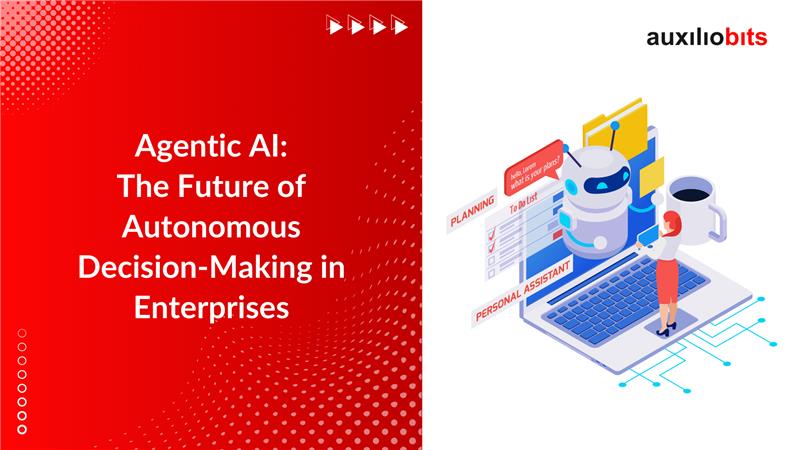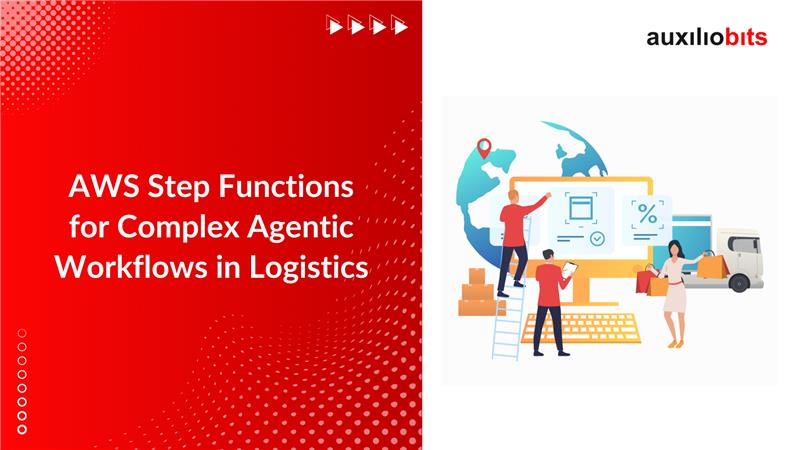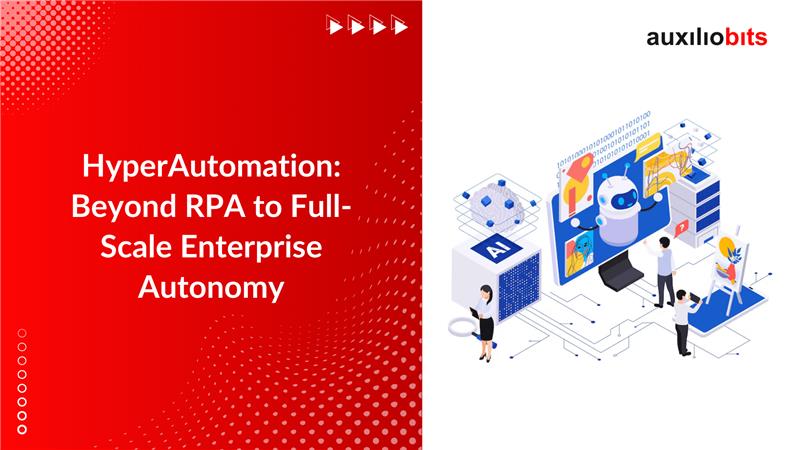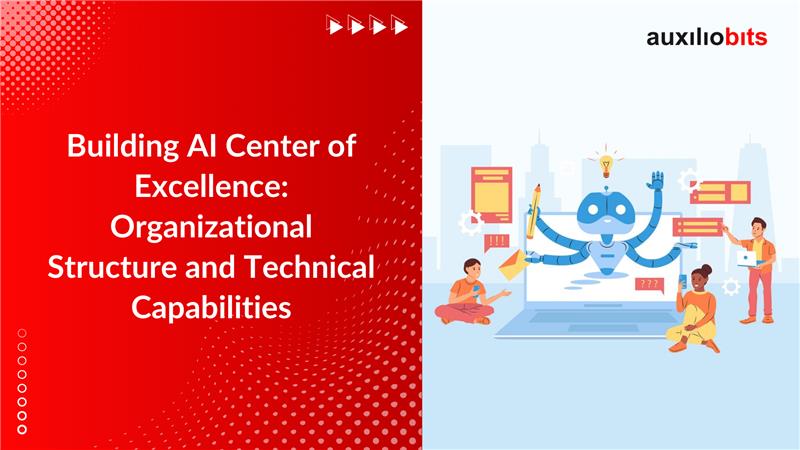
Even with the invention of new technologies, some businesses struggle with operational efficiency. Some of them stop functioning while others take time to make decisions. This gives rise to unwanted problems. Are you one such business? If yes, now is the time to implement agentic AI. From making suitable and quick judgments to enhancing business processes, agentic AI will never disappoint businesses. On the one hand, where conventional methods are inadequate to achieve operation excellence, agentic AI does it all with little to zero human intervention.
We have your back if you don’t know how agentic AI works. Agentic AI uses advanced algorithms, awareness, and natural language processing to identify data. It also helps anticipate outcomes and make judgments without wasting time. Because conventional methods depend on instructions, agentic AI comes in handy. It evaluates the current state, learns from it, and adapts to changing environments.
Also explore: The Role of a HyperAutomation CoE in Standardizing Automation-as-a-Service Across Enterprises.
Key Features of Agentic AI
Agentic AI offers firms never-ending advantages. Nevertheless, to better understand the impact of agentic AI, let’s look at its key features that provide reliability and effectiveness. Below mentioned are some of them:
1. Independent Decision-Making
Because agentic AI functions independently, making quick and wise decisions without human input becomes simple. Agentic AI considers data in real-time to respond to changes without wasting time. In addition to this, it can also execute tasks autonomously. This advantage benefits industries that need quick decision-making, such as logistics, finance, and healthcare. Autonomous decision-making also lessens human mistakes. In addition, it guarantees that operations continue even when the environments are unpredictable.
2. Contextual Awareness
Unlike conventional systems, agentic AI can possess contextual understanding. It identifies data about business space, taking into account variables like customer behavior, market changes, and competitor actions. This awareness helps businesses make relevant decisions. For example, in supply chain management, agentic AI can adjust procurement plans based on supplier performance, demand changes, and weather conditions.
3. Adaptability
With time, agentic AI keeps changing and learning from past experiences. With the help of advanced ML learning models, agentic AI enhances its decision-making procedures. This cannot be taken lightly if businesses want to predict unforeseen events and market conditions. Businesses benefit from AI systems because they grow with every wise decision.
4. Goal-Oriented Functionality
Agentic AI ensures that any action it takes always aligns with company objectives. Companies can make decisions and contribute to expected results by developing KPIs and predefined goals. Whether the aim is to lessen costs, improve customer service, or optimize production, agentic AI ensures that these goals are fulfilled.
5. Human Collaboration
Even though agentic AI is designed to make independent decisions, it takes pride in collaborating with human employees when required. It offers decision support to employees when needed. By analyzing actionable insights and large datasets, agentic AI allows employees to make decisions they won’t regret in the future. In addition, agentic AI also helps automate everyday functions, letting employees prioritize tasks that need immediate attention.
The Role of Agentic AI in Enterprise Decision-Making
In a business environment, decisions are daunting and consist of numerous variables. Agentic AI is helpful because it works wonders for businesses. That said, we have listed the role of agentic AI in various industries to learn better. Below are listed some of them:
1. Supply Chain Management
Agentic AI helps predict demand patterns and guarantees that inventory is maintained. This helps companies avoid situations like stockouts or overstocking. Apart from this, agentic AI can also analyze changes in the market. Therefore, it forecasts demand, allowing businesses to make proactive decisions. Lastly, agentic AI streamlines supplier evaluations and optimizes transportation routes, improving supply chain efficiency.
2. Customer Support
Agentic AI also offers innovative chatbot responses. Using natural language processing, agentic AI provides efficient and personalized customer support, lessening wait times and improving customer service. Moreover, agentic AI evaluates customer sentiment by receiving feedback and conversions. Apart from this, agentic AI also consists of past behaviors. Once this is done, AI systems recommend personalized solutions to businesses.
3. Finance and Risk Management
Using pattern recognition, agentic AI can quickly identify financial statement anomalies, helping avoid fraudulent transactions. Agentic AI algorithms also identify financial data to offer suitable credit risk assessments, improving decision-making during lending procedures. Moreover, expenditure patterns and revenue trends should be considered, and artificial intelligence systems should generate trustworthy financial budgets and forecasts.
4. Healthcare
Agentic AI uses medical data to help with diagnosis. It processes vast amounts of medical data to recommend potential treatment options and diagnoses. Moreover, it tailors treatment suggestions to the patient’s history and health data. By predicting patient flow, artificial intelligence also helps hospitals optimize resource utilization.
5. Manufacturing
Agentic AI also helps predict machine failures. It uses AI sensors and advanced algorithms to identify equipment failure, lessening downtime. Moreover, AI systems adjust real-time production schedules based on demand fluctuations and operational constraints. They also identify defects and suggest corrective actions, ensuring product quality.
Also explore: How are AI Agents Driving Business Ecosystems with Less Input?
Best Practices for Implementing Agentic AI
Implementing Agentic AI in an enterprise setting can unclose value by streamlining operations, enhancing decision-making, and driving innovation. However, to ensure successful adoption, organizations must follow a structured approach. From defining clear objectives to ensuring data readiness, each step plays a critical role in the effective implementation of Agentic AI. Below are some best practices to consider for a seamless AI integration.
1. Identify Clear Objectives
Begin by defining specific business goals that Agentic AI will address. Determine the areas where AI-driven decisions can have the most significant impact, such as cost reduction, operational efficiency, or customer satisfaction.
2. Ensure Data Readiness
Data quality is essential for effective AI implementation. Organizations should invest in data management systems to clean, structure, and integrate data from various sources, ensuring accurate AI predictions and decisions.
3. Start with Pilot Projects
Launch small-scale pilot projects to test Agentic AI in controlled environments. Evaluate its performance, identify challenges, and measure ROI before expanding AI adoption across the enterprise.
4. Collaborate with AI Experts
Partner with AI solution providers or hire skilled AI professionals to guide implementation. Experienced experts can help tailor AI systems to meet your business needs and ensure seamless integration. Their skills and expertise will help your business grow with changing market conditions.
5. Ensure Ethical AI Practices
Establish clear guidelines for ethical AI usage. Implement governance frameworks to monitor AI decision-making, prevent bias, ensure transparency, and comply with regulations. It is essential to ensure ethical artificial intelligence practices are followed to achieve the best results.
6. Continuous Monitoring and Optimization
Monitor AI performance using defined KPIs regularly. Continuously refine algorithms and update AI models based on real-time feedback to maintain accuracy and effectiveness.
Future Trends in Agentic AI
The future of Agentic AI is filled with groundbreaking advancements that will further accelerate its adoption across industries. Companies can expect more thoughtful decision-making, improved collaboration, and greater operational efficiency. Here are some key trends shaping the future of Agentic AI:
1. Explainable AI (XAI)
As AI systems become more autonomous, it is crucial to ensure transparency and understanding of their decision-making processes. XAI) enhances transparency by making AI decisions interpretable and explainable to humans. This fosters trust in AI systems and ensures compliance with regulatory standards. Companies that adopt XAI will have greater visibility into AI-driven decisions, allowing them to make well-informed adjustments when necessary.
2. Federated Learning
Federated learning is revolutionizing AI training by enabling decentralized learning models. Instead of transferring data to a central location, AI systems learn from multiple decentralized sources while preserving data privacy. This is particularly valuable in industries like healthcare and finance, where data confidentiality is paramount. Organizations can build powerful AI models by leveraging federated learning without compromising sensitive information.
3. AI-Augmented Teams
Human-AI collaboration will continue to advance with the integration of AI-augmented teams. Agentic AI will act as a co-pilot, assisting employees by automating routine tasks, analyzing data, and providing actionable insights. This collaboration boosts productivity, allowing human workers to focus on strategic and creative responsibilities. Industries such as customer service, finance, and logistics will benefit significantly from AI-augmented teams.
4. Sustainability Optimization
Sustainability is becoming a key priority for enterprises, and Agentic AI plays a vital role in optimizing resource consumption and reducing carbon footprints. AI-powered systems analyze energy usage, monitor supply chains, and recommend eco-friendly solutions. From optimizing transportation routes to minimizing waste in manufacturing, Agentic AI helps businesses achieve their sustainability goals while maintaining profitability.
The Summary
The key features and applications of Agentic AI illustrate its transformative role in enterprise decision-making. From supply chain optimization to personalized customer support, AI systems empower businesses to achieve agility, efficiency, and innovation. By adopting agentic AI, organizations can navigate complex challenges.
Contact Auxiliobits, your trusted partner in AI-powered transformation, for expert guidance on implementing agentic AI solutions.






